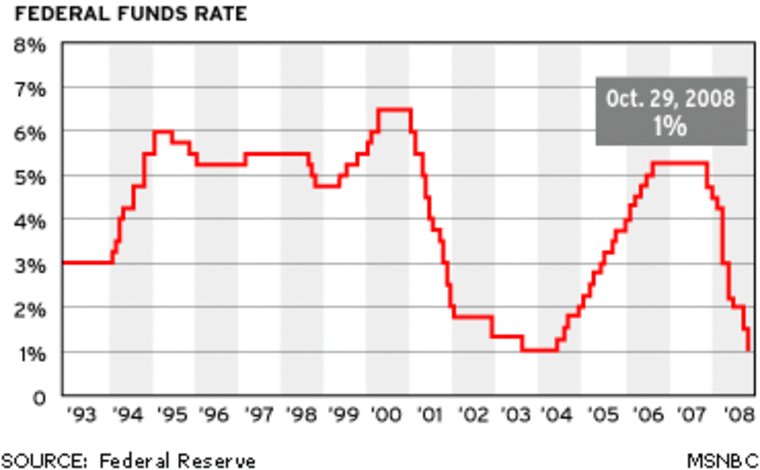The Federal Reserve raised short-term interest rates for the eighth time in 10 months Tuesday and suggested that more rate hikes are coming as central bankers keep their focus on stamping out inflation even as they acknowledge a recent slowdown in growth.
Continuing a steady succession of moves that have raised borrowing costs for businesses and consumers, Fed Chairman Alan Greenspan and his colleagues hiked the benchmark overnight lending rate by a quarter-percentage point to 3 percent, up from a 46-year low of 1 percent less than a year ago. The Fed acted despite noting that spending growth has "slowed somewhat" recently, at least in part due to rapidly rising energy prices.
The quarter-point hike was widely anticipated, and market analysts saw no hint that the Fed might be ready to step to the sidelines anytime soon. In fact the Fed appeared slightly more concerned about inflation than it was at the last meeting of policy-makers March 22.
"Pressures on inflation have picked up in recent months and pricing power is more evident," the Fed said in a statement announcing the rate hike.
"This statement was slightly more hawkish," said J.P. Morgan Chase senior economist Jim Glassman, referring to the Fed's growing concern about inflation. "If it weren't for the inflation news, I think we would see the signs of the Fed taking a pause."
In a highly unusual move, however, the Fed issued a corrected policy statement just five minutes before major stock markets closed for the day and nearly two hours after its original rate-hike announcement.
The corrected statement added: "Longer-term inflation expectations remain well contained." The comment, which had the effect of making central bankers seem slightly less concerned about inflation, had been "dropped inadvertently," the Fed said.
Stock prices rose sharply after the amended statement was issued, pushing the Dow Jones industrial average into positive territory for the day. Bond prices were little changed, reflecting the Fed's mixed assessment of growth and inflation, analysts said.
Even after excluding the price of energy, consumer prices rose 2.2 percent in the first quarter, up from 1.7 percent in the prior quarter, based on an index released last week that the Fed is known to watch closely. The same report showed that the economy grew at a slower-than-expected pace of 3.1 percent in the first quarter, down from 3.8 percent at the end of 2004.
"The Fed apparently remains quite confident about the prospects for economic growth, despite the signs of recent slowing," said Lynn Reaser, chief economist for Banc of America Capital Management. "At the same time they are more concerned about recent pressures on inflation."
In its statement, Fed also noted in a statement the economy continues to create jobs and said it expects to continue raising rates at a "measured" pace. Since the Fed began raising rates in June 2004, that has meant a steady diet of quarter-point rate hikes after every scheduled meeting of Fed policy makers.
But analysts said the Fed's comments about slowing growth and rising inflation left it a little more flexibility going forward. Rising inflation would suggest that a more aggressive approach on rates is needed, while slowing growth might mean that the Fed should pause soon.
Within an hour after the Fed's rate announcement, several commercial banks followed suit with a quarter-point increase in the prime rate, which is a key rate for many business and consumer loans. The prime is now at 6 percent, up from 4 percent a year ago.
Fed officials have said they are aiming to bring rates up from an unusually low level to something considered more "neutral" for growth and inflation. While Greenspan and others have not indicated what neutral is, most analysts expect the Fed to raise rates again at the next FOMC meeting in June, and probably again after that.
Analysts say Greenspan would like to get back to a neutral level of rates before he ends his 18-year term as Fed chief next year, as he must do when his term on the board ends in January 2006.
A top White House economic adviser told business journalists Monday that the economy hit a "soft patch" in March due to higher oil prices, but he predicted the economy will continue on a sustainable path of growth.
Even as the Fed is raising rates, long-term interest rates have been drifting lower in responses to the hints of economic weakness, leaving rates on 30-year mortgages well below 6 percent.
